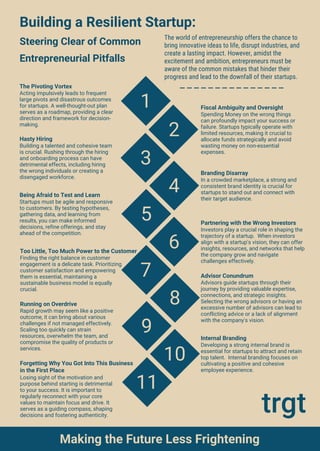Discover the secrets to beating the odds and becoming part of the elite 8% of startups that achieve remarkable success!
 Image courtesy of jose luis Umana via Pexels
Image courtesy of jose luis Umana via Pexels
Table of Contents
The Startup Dream: Creating Innovative Solutions and Conquering the World, But Why Do So Many Fail?
Starting a new venture is an exhilarating experience, filled with hopes and aspirations. However, the harsh reality is that the majority of startups fail. In fact, studies show that only 1 out of 12 startups actually succeeds. So, what sets that 1 apart from the rest? In this blog post, we will dissect the common pitfalls that lead to startup failure and explore the secrets behind the success of the lucky few.
Underestimating Market Demand and Poor Product-Market Fit
One of the primary reasons startups fail is the lack of understanding of the market demand and a poor product-market fit. Many entrepreneurs dive headfirst into their ventures without conducting thorough market research to identify the needs and preferences of their target audience. By not aligning their products or services with a significant pain point or offering a desirable solution, they set themselves up for failure.
For startups to flourish, it is crucial to delve deep into market research. Understanding the dynamics of the target market, identifying gaps, and analyzing the competition can provide valuable insights. By finding a genuine problem to solve and delivering a product or service that meets the market’s demand, startups have a higher chance of thriving.
Insufficient or Ineffective Business Planning
The importance of robust business planning cannot be overstated. Unfortunately, many startups plunge into their ventures without a well-defined business model, clear goals, or actionable strategies. This lack of planning leaves them directionless and susceptible to failure.
Successful startups invest time and effort into crafting a comprehensive and flexible business plan. They define their target audience, revenue streams, marketing strategies, and operational processes. By having a clear plan in place, startups can better navigate challenges and seize opportunities that come their way.
Lack of Adequate Funding and Financial Management
Starting a business requires capital. However, many startups struggle to secure adequate funds to kickstart their operations or sustain their growth. The lack of funding can hinder product development, marketing efforts, hiring, and overall progress.
 Image courtesy of via Google Images
Image courtesy of via Google Images
Exploring various funding options such as angel investors, venture capitalists, or crowdfunding platforms can provide startups with much-needed financial support. Additionally, establishing sound financial management practices is paramount to making the most out of limited resources. By keeping a close eye on expenditures, tracking cash flow, and making strategic financial decisions, startups can maximize their chances of success.
Weak Leadership and Team Dynamics
Behind every successful startup is a strong leader who can inspire their team and drive the company towards its goals. Weak leadership and dysfunctional team dynamics can be incredibly detrimental to the overall success of a startup.
Effective leaders possess qualities such as adaptability, vision, and the ability to motivate and empower their teams. They create a positive and conducive work environment that fosters innovation, collaboration, and a shared sense of purpose. By nurturing strong leadership and cultivating healthy team dynamics, startups can harness the full potential of their workforce and increase their chances of flourishing.
Failure to Pivot and Adapt in the Face of Change
The market is constantly evolving, and startups that fail to adapt often find themselves becoming obsolete. A rigid business model and an unwillingness to pivot when necessary can be fatal for startups.
 Image courtesy of via Google Images
Image courtesy of via Google Images
Successful startups understand the importance of being responsive to market changes and consumer trends. They continuously monitor the landscape, stay abreast of industry developments, and proactively adapt their strategies. By being nimble, embracing change, and fearlessly exploring new opportunities, startups can position themselves ahead of the curve and increase their chances of long-term success.
Conclusion
Starting a successful startup is undoubtedly challenging, but by avoiding common pitfalls and learning from the failures and successes of others, entrepreneurs can significantly increase their chances of being the 1 in 12 that flourishes. Understanding the market, planning carefully, securing adequate funding, fostering strong leadership and team dynamics, and embracing adaptability are key ingredients for startup success.
While the journey might be arduous, it is important to remember that every failure is an opportunity to learn and grow. By staying resilient and continually iterating, entrepreneurs can increase their odds of creating a thriving startup that stands out from the rest.







